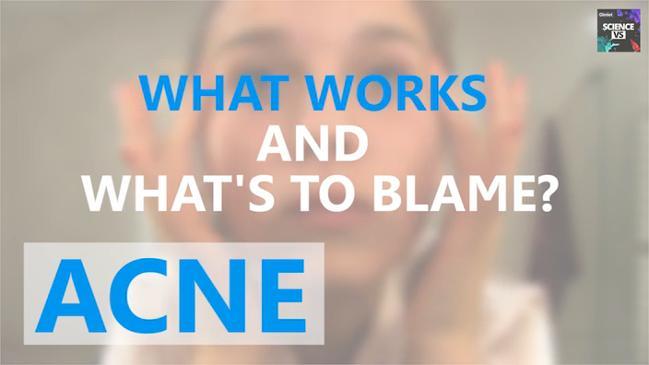The (lack of) science behind acne treatments
WHAT really gets rid of pimples? There’s a surprising lack of science behind most acne treatments. In reality, there are only two things that work.

PIMPLES. They can be something that pop up once a month, or they can take over your face (and your life!) for years.
And sometimes, they don’t go away once you reach adulthood. One survey found that 40% adults still deal with zits in their 30s.
But what can you do to get rid of them? Our team at Science Vs dived into the science to find out.
We started our research by heading to a high-end skin store in Brooklyn, New York. There were dream catchers and it smelled great.
Jill, a buyer for the store, told us their products could “definitely” improve someone’s acne. But when I asked the rather simple question: Do you have evidence? She looked befuddled. “When you say evidence, I’m not sure what you mean,” said Jill.
“It’s like not that scientific here. It’s, like, girlfriend vibes”.
Americans fork out $US2.5 billion each year buying products to treat acne. Are all of them running off “girlfriend vibes”?
While it might look like there are a lot of different products out there — when you head to a standard chemist — most acne treatments have two active ingredients in them: either Benzoyl peroxide or Salicylic acid.
Salicylic acid is an exfoliant, so it’s supposed to work by unplugging hair follicles, which is where pimples form. Despite its popularity, it hasn’t been well studied.
The American Academy of Dermatology Guidelines called clinical trials into salicylic acid “limited” and another paper published in Nature Reviews noted that we don’t have enough evidence to say that salicylic acid can help people with acne, and “future studies are needed”.
“Salicylic acid has not absolutely been tested,” says Dr Jonathan Weiss, a dermatologist who helped write the AAD Guidelines. He says it might be helpful for some people with mild acne but “It’s relatively weak”.
What about Benzoyl peroxide? If you’ve ever used it, you know you can put bleach stains all over your clothes, towel and sheets. That’s because benzoyl peroxide is a bleach. It’s supposed to kill pimples, by killing the bacteria on your skin, which might encourage pimples to form. “We like to think of it as dropping a little bomb on them,” says Dr Weiss.
Here, there’s some good news. A review paper found that, Benzoyl Peroxide “may be beneficial for acne”, but also noted that there wasn’t “high quality evidence” to show that it helped.
The reason that dropping bombs on bacteria isn’t a cure-all is because acne can be caused by a whole range of things besides bacteria — including excess oil on your skin, dead skin cells, hormones as well as genetics. One study of more than 1000 teens found that having someone else in your family with acne doubled your risk of getting severe to moderate acne.
Since what makes pimples form is so complicated, getting rid of them is also not as simple as cleaning your face. A Lancet paper found that there is “no good evidence that acne is caused or cured by washing”.
In fact, the only treatment that the dermatologists we spoke to for our podcast said worked really well was Isotretinoin, which you might know by the brand name Accutane. “It gets some of the most severe acne under control,” says Jonathan.
This drug blocks the major processes in the body known to lead to acne, it can tweak how your genes express themselves, shrink your oil glands and even change the way that you make skin cells.
Isotretinoin might sound like the miracle acne treatment, but it has some major side effects. The drug can dry out your skin, leaving it red and raw for the first month or so. If a woman gets pregnant on Isotretinoin it can cause problems to the foetus, and there is a very small risk of getting depression from taking the drug.
The risk of depression is so small that when you look at large studies, statistically researchers can’t detect it. Jonathan says that over 30 years, he’s “treated thousands of patients with isotretinoin” and only seen patients get affected a handful of times. But still, he says, it’s a side effect worth looking out for.
When it comes to acne, there’s no easy fix. And while a lot of people and companies promising solutions, there’s a lot less science to many of their claims.
To find out more about acne treatments, including whether changing your diet can help, listen to Science Vs. Plus, in the podcast, Dr Sandra Lee (aka Dr Pimple Popper) tells us when we can pop our pimples.
